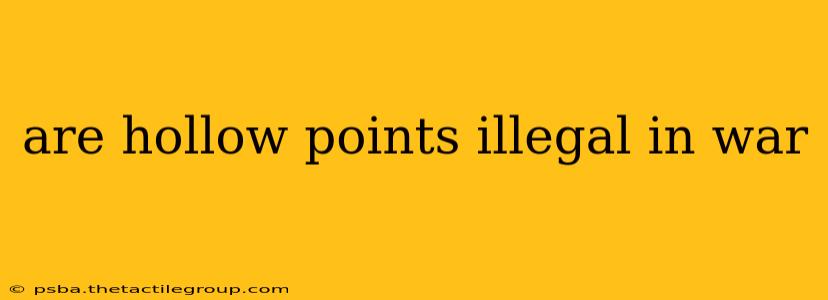The legality of hollow-point bullets in war is a complex issue, far from a simple yes or no answer. While there's no outright global ban, their use is governed by a nuanced interplay of international humanitarian law, national laws, and practical considerations on the battlefield.
The Hague Conventions and the Prohibition of Expanding Bullets
The key legal framework centers around the Hague Conventions of 1899 and 1907. These conventions, while not explicitly mentioning "hollow points" by name, prohibit the use of bullets that easily expand or flatten upon impact, causing unnecessary suffering. The intent is to avoid weapons that inflict excessive injury beyond what's necessary to neutralize an enemy combatant.
Defining "Unnecessary Suffering"
The crucial ambiguity lies in the definition of "unnecessary suffering." What constitutes excessive injury is not precisely defined, leading to differing interpretations and legal gray areas. Some argue that the expanding nature of hollow-point bullets inherently causes more severe wounds than other types of ammunition, thus violating the spirit, if not the letter, of the Hague Conventions. Others contend that the severity of the wound is dependent on factors like bullet caliber, velocity, and the target's anatomy, making a blanket ban on hollow-points impractical and overly restrictive.
The Practical Considerations of Battlefield Use
The reality of modern warfare further complicates the issue. Hollow-point bullets, often favored by law enforcement and some militaries for their stopping power, offer advantages in close-quarters combat and situations where minimizing collateral damage is critical. Their rapid expansion means a higher likelihood of incapacitating a target quickly, potentially reducing prolonged engagements and the risk of injuring civilians.
However, this very characteristic – the rapid expansion leading to potentially more severe wounds – is the same aspect that raises concerns under international humanitarian law. The argument centers around the balance between achieving military objectives and adhering to the principles of proportionality and minimizing harm to non-combatants.
National Laws and Military Regulations
Individual nations have varying legal frameworks regarding the use of ammunition in warfare. While some may explicitly prohibit or restrict certain types of expanding ammunition, others might allow their use based on specific operational requirements or military doctrine. This creates an international patchwork of regulations, complicating the overall legal landscape.
Conclusion: A Lack of Clear-Cut Answers
Ultimately, the legality of hollow-point bullets in war remains a matter of ongoing debate and interpretation. The absence of a definitive global prohibition doesn't equate to blanket approval. The use of such ammunition is weighed against the principles of international humanitarian law, national laws, and the practical realities of modern combat. Each case must be examined individually considering the specific circumstances and the potential for violating the principles of proportionality and minimizing unnecessary suffering.
Disclaimer: This article provides general information and analysis on a complex legal and ethical topic. It is not intended as legal advice. For specific legal questions, consult with an expert in international humanitarian law.

